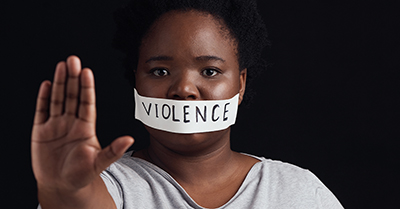BLACKPRESSUSA NEWSWIRE — The truth is, we all know someone who is experiencing domestic violence. By the time you finish reading this, three women will have been murdered by an intimate partner. But here is the hope: We have the knowledge, the tools, and the programs to stop it.
By Nathaniel M. Fields, CEO, Urban Resource Institute
October is Domestic Violence Awareness Month, a time to honor survivors, remember those we have lost, and confront one of the most pervasive and deadly forms of violence in our society. Yet year after year, this month passes with too little outrage and too little action.
As a Black man and the CEO of the Urban Resource Institute, the largest provider of domestic violence shelter services in the United States, I feel a deep responsibility to speak plainly. Domestic violence is a shadow pandemic in America.
Every minute, 24 people experience physical, emotional, or psychological harm from an intimate partner. One in four women and one in seven men will endure this abuse in their lifetime. By the end of the day, three women would have been murdered by an intimate partner. For Black and brown women, the impact is far more devastating-both in scale and in severity.
Across the country, systemic inequities make safety, healing, and justice painfully out of reach. Black women represent only 14 percent of the U.S. population but account for 31 percent of intimate partner homic ides. They are three and a half times more likely to be killed by a partner than white women and five times more likely to die by firearm during pregnancy. Between 201O and 2021, the number of Black women killed by guns tripled, with domestic violence driving much of that increase.
These are not just statistics. They are lives lost, families shattered, and communities left grieving in silence. And still, domestic violence remains one of the most underreported crimes in America. Too many survivors, especially women of color, stay silent out of fear, discrimination, or mistrust of systems that have too often failed to protect them.
For Black and brown women, those fears are magnified by economic abuse, the hidden weapon of control. Nearly every survivor experiences some form of financial coercion. Partners withhold money, destroy credit, sabotage jobs, and seize vital documents. When someone cannot open a bank account, work, or pay rent without permission, leaving is not a choice-it becomes a matter of survival.
We must face a hard truth: we cannot end domestic violence without addressing economic abuse and homelessness.
While the Violence Against Women Act in 1995 marked a turning point, our systems still fall short. Survivors need more than shelter. They need economic independence, accountability for those who have caused harm, and prevention that begins early.
At the Urban Resource Institute, we meet survivors where they are. We provide safe, trauma-informed shelters for individuals, families, and even their pets because safety should never come with conditions. We equip survivors with job readiness, legal support, and financial tools to rebuild their lives with stability and dignity. We reach young people through our Relationship Abuse Prevention Program, teaching what healthy relationships look like long before abuse begins. And through our Abusive Partner Intervention Program, we work directly with those who have caused harm to build accountability and change.
These programs work. They are changing lives every day. Yet too often, funding for prevention and intervention is seen as optional rather than essential. If we are serious about ending domestic violence, we must invest in solutions that address the full continuum-from emergency shelter to long-term stability, from survivor safety to offender ac countability.
The truth is, we all know someone who is experiencing domestic violence. By the time you finish reading this, three women will have been murdered by an intimate partner. But here is the hope: We have the knowledge, the tools, and the programs to stop it.
What we need now is the will.
We must raise awareness, remove stigma, and make resources visible and accessible. Policymakers must prioritize prevention and invest in grassroots organizations that meet survivors where they are. Communities must speak up, believe survivors, and hold abusers accountable.
This generation has the power to end the shadow pandemic. We can make safety, healing, and justice a reality for every survivorif we act now.
Let’s get to work.

